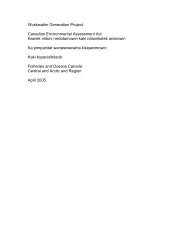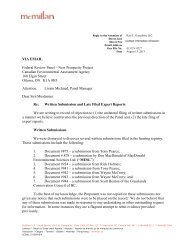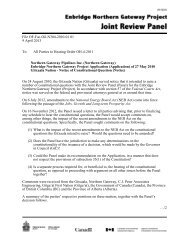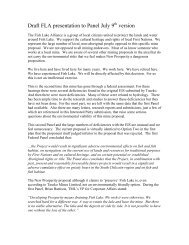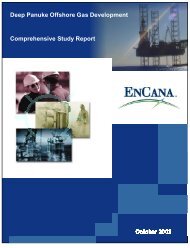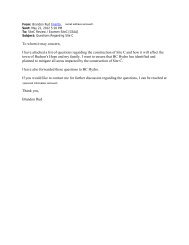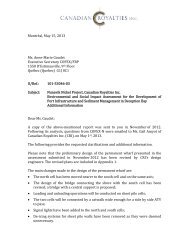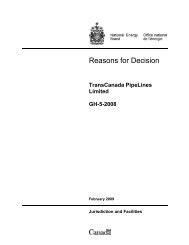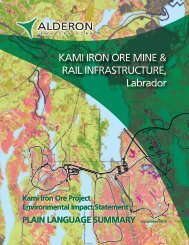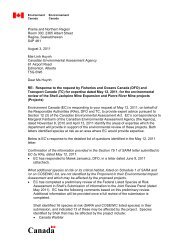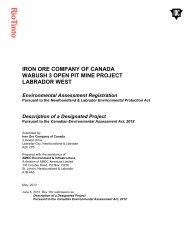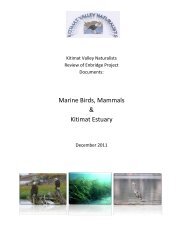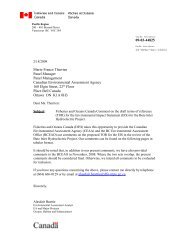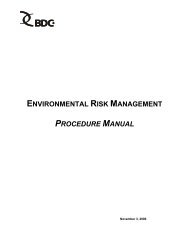ATHABASCA CHIPEWYAN FIRST NATION SUBMISSION ERCB ...
ATHABASCA CHIPEWYAN FIRST NATION SUBMISSION ERCB ...
ATHABASCA CHIPEWYAN FIRST NATION SUBMISSION ERCB ...
Create successful ePaper yourself
Turn your PDF publications into a flip-book with our unique Google optimized e-Paper software.
<strong>ATHABASCA</strong> <strong>CHIPEWYAN</strong> <strong>FIRST</strong> <strong>NATION</strong> <strong>SUBMISSION</strong><br />
<strong>ERCB</strong> APPLICATION NO. 1554388<br />
CEAR No. 59540<br />
WILL SAY STATEMENT OF<br />
BEATRICE DERANGER<br />
Beatrice Deranger will give the following evidence on behalf of the Athabasca<br />
Chipewyan First Nation in respect of the Notice of Question of Constitutional Law and<br />
the hearing of the application.<br />
Family History<br />
• Ms. Deranger was born in Fort Smith, North West Territories in 1963 and has<br />
been an ACFN member since birth. She grew up in Fort Chipewyan, on her<br />
family’s trapline in Saskatchewan and then in Fort McMurray. She has been<br />
living in Fort McMurray since she was twelve years old.<br />
• Her mother is Dora Flett, an ACFN member.<br />
Traditional Activities<br />
• Ms. Deranger will speak about ACFN practices of hunting, trapping, gathering<br />
and fishing.<br />
• Ms. Deranger will also speak about her use of lands in and around Fort McMurray<br />
and Fort McKay, and in specific the lands around Kearl Lake, north of Fort<br />
McKay.<br />
• She will describe her personal experiences carrying on traditional activities on the<br />
land with her family and with other members of ACFN, and what others have<br />
passed along to her.<br />
• Ms. Deranger will speak about the cultural and spiritual connections to the land,<br />
animals and plants that she has learned and practiced as an ACFN member.<br />
Changes Observed in ACFN Traditional territory<br />
• Ms. Deranger will speak about the impacts of development, and in particular, oil<br />
sands development on the people, animals, land, water, vegetation in ACFN<br />
territory.<br />
• Ms. Deranger will also speak about the changes in the area around Kearl Lake and<br />
the impacts she has noticed, and what the proposed Shell Jackpine expansion will<br />
do to her ability to practice her treaty rights.<br />
• Ms. Deranger will speak about the impacts oil sands development is having on<br />
ACFN culture.<br />
• She will also speak about her and other ACFN members’ lost connection with<br />
land taken up for development.<br />
• Ms. Deranger will speak about the difficulty in finding suitable areas to take her<br />
children to hunt and gather in ACFN territory due to oil sands development and<br />
the impact it has on her when she sees harvesting grounds taken up for oil sands<br />
development.<br />
• Ms. Deranger will speak about how discouraging it is to try and access ACFN<br />
territory when there are fences and security gates to pass through.
<strong>ATHABASCA</strong> <strong>CHIPEWYAN</strong> <strong>FIRST</strong> <strong>NATION</strong> <strong>SUBMISSION</strong><br />
<strong>ERCB</strong> APPLICATION NO. 1554388<br />
CEAR No. 59540<br />
• Ms. Deranger will speak about her observations on how an oil sands operation<br />
affects the wildlife populations and ACFN practices well beyond its physical<br />
footprint.
<strong>ATHABASCA</strong> <strong>CHIPEWYAN</strong> <strong>FIRST</strong> <strong>NATION</strong> <strong>SUBMISSION</strong><br />
<strong>ERCB</strong> APPLICATION NO. 1554388<br />
CEAR No. 59540<br />
WILL SAY STATEMENT OF<br />
CHARLIE VOYAGEUR<br />
Mr. Charlie Voyageur will give the following evidence on behalf of the Athabasca<br />
Chipewyan First Nation in respect of the Notice of Question of Constitutional Law and<br />
the hearing of the application.<br />
Family History<br />
• Mr. Charlie Voyageur was born in 1932 at Jackfish Lake, he is an ACFN<br />
member.<br />
• His parents Isadore and Colombe Voyageur were also ACFN members, they had<br />
12 children including Mr. Voyageur and raised them around Jackfish Lake.<br />
Traditional Activities<br />
• Mr. Charlie Voyageur will describe the seasonal round and how different<br />
resources require travel and access to different parts of the traditional lands at<br />
various times of the year.<br />
• Mr. Voyageur will describe the importance of place and traditional locations to<br />
the exercise of rights. It is important to know the land you are using.<br />
• People could travel and explore new areas more in the old days because there<br />
were relatives, other land users to show them around.<br />
• In the 1940s many ACFN members used the area around Fort McKay, Muskeg<br />
River and Kearl Lake. Mr. Voyaguer has hunted, trapped and fished in this area<br />
with his aunt Alice Boucher, uncle Alec Boucher, and their family.<br />
• Kearl Lake was an important and very good hunting location. The family would<br />
walk from Fort Mckay to Kearl Lake with dog packs for different resources in<br />
different seasons. Mr. Voyageur observed other families travelling to and using<br />
Kearl Lake as well.<br />
• Mr. Voyageur will discuss the importance of fish as a traditional resource.<br />
• Mr. Voyageur devotes time to passing on traditional ways of life to young people.<br />
Impacts to the Traditional Lands and Way of Life<br />
• Mr. Voyageur will discuss the impact that the registered trapline system and other<br />
government initiatives have had on ACFN members’ ability to use traditional<br />
lands in their traditional pattern.<br />
• ACFN people used to live on and use the area around Fort McKay and all the way<br />
down the Athabasca River.<br />
• Mines and other projects end the traditional way of life where they are located.<br />
• Once fences and private property signs are up, Mr. Voyageur believes those areas<br />
are no longer available for his use.<br />
• Mr. Voyageur has to carry water with him now to go out on the land.<br />
• Mr. Voyageur has observed increasing use of the Richardson Backcountry by<br />
non-native people.
<strong>ATHABASCA</strong> <strong>CHIPEWYAN</strong> <strong>FIRST</strong> <strong>NATION</strong> <strong>SUBMISSION</strong><br />
<strong>ERCB</strong> APPLICATION NO. 1554388<br />
CEAR No. 59540<br />
WILL SAY STATEMENT OF<br />
CHIEF ALLAN ADAM<br />
Chief Allan Adam will give the following evidence on behalf of the Athabasca Chipewyan First<br />
Nation (ACFN) in respect of the Notice of Question of Constitutional Law and the hearing of the<br />
application:<br />
Background<br />
• Chief Adam has lived in Fort Chipewyan for most of his life and is an ACFN member.<br />
• Chief Adam is an active land user.<br />
• Chief Adam has served as Chief since 2003 and previously served for four years as a<br />
Band Councilor<br />
• He will describe the current ACFN leadership structure and membership;<br />
• He will provide a profile of the present day ACFN community as well as ACFN<br />
institutions and organizations.<br />
ACFN History and Rights<br />
• Chief Adam will describe the history of the ACFN, including how ACFN is a signatory<br />
to Treaty 8;<br />
• He will speak about ACFN’s organization as a “band” under the Indian Act and ACFN’s<br />
eight reserves.<br />
• He will give an overview of some defining events such as the creation of Wood Buffalo<br />
National Park and the building of the Bennett Dam and how that has affected ACFN<br />
members ability to carry out their traditional activities and practices.<br />
• Chief Adam will speak to the importance of aboriginal and treaty rights, and associated<br />
cultural activities, to community health, identity, economy and cultural survival.<br />
ACFN Traditional Territory<br />
• Chief Adam will explain how the ACFN has always utilized a large range of territory to<br />
carry out their traditions and traditional activities and practices;<br />
• He will describe the importance of water to the Athabasca Chipewyan way of life;<br />
• He will describe the cultural and spiritual connection between ACFN members and the<br />
land;<br />
• He will describe why ACFN members cannot simply “go elsewhere”;<br />
• He will describe the increasing pace and magnitude of development within ACFN’s<br />
traditional lands, and how the Crown is failing to ensure that ACFN retains a meaningful<br />
ability to exercise its treaty rights.<br />
Consultation with the Crown<br />
• Chief Adam will speak to ACFN leadership’s efforts to raise the importance of their<br />
constitutionally-protected rights with the federal and provincial governments and third<br />
parties;
<strong>ATHABASCA</strong> <strong>CHIPEWYAN</strong> <strong>FIRST</strong> <strong>NATION</strong> <strong>SUBMISSION</strong><br />
<strong>ERCB</strong> APPLICATION NO. 1554388<br />
CEAR No. 59540<br />
• He will explain how the ACFN has participated in a number of processes with<br />
government and industry;<br />
• He will describe the correspondence between ACFN leadership and the federal and<br />
provincial governments and third parties that relates to consultation and accommodation<br />
and to the assertion of ACFN’s constitutionally-protected Treaty rights.<br />
• He will explain how ACFN has made the governments of Canada and Alberta aware of<br />
ACFN’s traditional territory, including places of particular importance to ACFN, and<br />
ACFN’s use of that territory;<br />
Community Concerns<br />
• Chief Adam will present the ACFN membership’s concerns with past, present, and<br />
proposed developments that have had or will likely have impacts on their lives;<br />
• He will describe how ACFN leadership has made the federal and provincial governments<br />
aware of these concerns;<br />
• He will explain how the ACFN people are concerned that they will be displaced from<br />
their territories once again;<br />
• He will describe how traditional resources are crucial for ACFN culture and traditional<br />
activities and the impacts the ongoing degradation of these resources is having on<br />
ACFN’s culture and way of life.
<strong>ATHABASCA</strong> <strong>CHIPEWYAN</strong> <strong>FIRST</strong> <strong>NATION</strong> <strong>SUBMISSION</strong><br />
<strong>ERCB</strong> APPLICATION NO. 1554388<br />
CEAR No. 59540<br />
WILL SAY STATEMENT OF<br />
DOREEN SOMERS<br />
Ms. Doreen Somers will give the following evidence on behalf of the Athabasca<br />
Chipewyan First Nation in respect of the Notice of Question of Constitutional Law and<br />
the hearing of the application.<br />
• Ms. Somers is a Treaty 9 Rights holder.<br />
• Ms. Somers has worked on behalf of First Nations in consultation processes in<br />
North Eastern Alberta since 2007, including but not limited to participating in<br />
Crown, regional, and multi-party processes related to the Lower Athabasca<br />
Regional Plan, the Comprehensive Regional Infrastructure Sustainability<br />
Program, Public Land Administrative Regulations, Land Use Framework, All<br />
Parties Core Agreement, Regulatory Enhancement, and the Oil Sands<br />
Developers Group.<br />
• Ms. Somers has previously worked for industry and Crown agencies on<br />
consultation and land related matters.<br />
• Ms. Somers is currently the ACFN Industrial Relations Corporation’s (“IRC”)<br />
Consultation Coordinator.<br />
• As Consultation Coordinator, Ms. Somers reviews, responds to, and coordinates<br />
ACFN IRC responses to applications to the Crown from industry, as well as to<br />
proposed legislative changes. Ms. Somers acts as a link between the IRC and<br />
ACFN elected Leadership, land users, elders and the Crown.<br />
• The IRC has raised concerns about direct and cumulative adverse impacts of<br />
development on ACFN’s constitutionally-protected rights as well as the<br />
downstream impacts of development, and the need for meaningful consultation<br />
and accommodation.<br />
• Ms. Somers will describe her observations regarding engagement processes<br />
involving the Province of Alberta and its delegates, including the timing, nature<br />
and outcomes of some of those consultation processes in which she has been<br />
directly involved, including with reference to other jurisdictions where she has<br />
worked.<br />
• Ms. Somers will describe her observations regarding engagement processes with<br />
Canada, including the timing, nature, and outcomes of some of those<br />
consultation processes in which she has been directly involved.
<strong>ATHABASCA</strong> <strong>CHIPEWYAN</strong> <strong>FIRST</strong> <strong>NATION</strong> <strong>SUBMISSION</strong><br />
<strong>ERCB</strong> APPLICATION NO. 1554388<br />
CEAR No. 59540<br />
WILL SAY STATEMENT OF<br />
JERRY ALLAN ADAM<br />
Jerry Adam will give the following evidence on behalf of the Athabasca Chipewyan First<br />
Nation in respect of the Notice of Question of Constitutional Law and the hearing of the<br />
application.<br />
Family History<br />
• Mr. Adam was born May 13, 1955 in Uranium City. He is an ACFN member.<br />
• Mary Olive Adam is his mother and Eusebe Adam is his father and both are<br />
ACFN members.<br />
• He moved to Fort Chipewyan when he was five years old and left in 1970 when<br />
he was15 years old. He went to school in Fort McMurray until 1975.<br />
• Mr. Adam has two sisters and eight brothers. The present Chief, Allan Adam, is<br />
one of his brothers.<br />
Traditional Activities<br />
• Mr. Adam will speak about ACFN practices of hunting, trapping, gathering and<br />
fishing.<br />
• Mr. Adam will speak about ACFN use of waterways and lands in ACFN’s<br />
territories from the north shore of Lake Athabasca south to Kearl Lake.<br />
• He will describe his personal experiences learning and carrying on traditional<br />
activities on the land with his family and with other members of ACFN.<br />
• Mr. Adam will speak about his personal experiences hunting, trapping and<br />
gathering various species of plants and animals.<br />
• Mr. Adam will speak to the abundance of wilfdlife and berries that he has seen<br />
and harvested in the Kearl Lake area in 2004.<br />
• Mr. Adam will also speak to the archaeological artifacts he has seen in the<br />
vicinity of Kearl Lake, and to oral traditions passed on by his father’s family.<br />
Changes Observed in ACFN Traditional Territory<br />
• Mr. Adam will speak about the changes he has observed in the water levels on the<br />
Athabasca River, Lake Athabasca and other water bodies in ACFN territory.<br />
• Mr. Adam will also speak about the discouraging effect changes in water levels<br />
have had on ACFN members’ ability to hunt.<br />
• Mr. Adam will speak about the impact the changes in water levels have had on his<br />
ability to travel through ACFN territory, to hunt for moose, birds and other<br />
animals, to gather, to trap, and to access areas for spiritual and other uses.<br />
• He will speak about the impacts of development, and in particular, oil sands<br />
development on the people, animals, land, water, vegetation and air over time.<br />
• He will speak about the changes he has observed in the abundance of wildlife<br />
such as muskrat and birds.
<strong>ATHABASCA</strong> <strong>CHIPEWYAN</strong> <strong>FIRST</strong> <strong>NATION</strong> <strong>SUBMISSION</strong><br />
<strong>ERCB</strong> APPLICATION NO. 1554388<br />
CEAR No. 59540<br />
• Mr. Adam will speak about the ways in which he has to modify his hunting<br />
practices and locations.<br />
• He will also speak to the decrease in hunting, trapping, gathering and fishing<br />
areas in ACFN territory as a result of oil sands operations.<br />
• He will speak to the ever shrinking number of places that ACFN members can use<br />
to teach their youth about hunting.<br />
• Mr. Adam will speak to his concerns about reclamation and the inability to<br />
recreate the muskeg on which the animals and healthy water systems rely.<br />
• Mr. Adam will also speak to the broader footprint and set of impacts that an oil<br />
sand operation has on the landscape.<br />
• Mr. Adam will speak to the increase in accessibility by others to the surrounding<br />
area after an oil sand operation is established.
<strong>ATHABASCA</strong> <strong>CHIPEWYAN</strong> <strong>FIRST</strong> <strong>NATION</strong> <strong>SUBMISSION</strong><br />
<strong>ERCB</strong> APPLICATION NO. 1554388<br />
CEAR No. 59540<br />
WILL SAY STATEMENT OF<br />
JOHN REED RIGNEY<br />
John Rigney will give the following evidence on behalf of the Athabasca Chipewyan<br />
First Nation in respect of the Notice of Question of Constitutional Law and the hearing of<br />
the application.<br />
Family History:<br />
• Mr. Rigney arrived in Fort Chipewyan in 1972 as teacher and has lived there ever<br />
since. Has taught many of the ACFN people that are now between the ages of 45<br />
and 52.<br />
• He works for ACFN as Athabasca Chipewyan First Nation Special Initiatives<br />
Manager. He has worked in various capacities for the Athabasca Chipewyan First<br />
Nation (“the ACFN”) since 1986, including Band Manager 1986-88 and 1995-<br />
2002, and Education Coordinator from 1990-94.)<br />
• He is married to Alice Rigney (nee Marcel), who has reapplied to be an ACFN<br />
member.<br />
• His brother in law is former Chief Pat Marcel. His father in law was Benjamin<br />
Marcel who served as headman from approximately 1927, the year of Chief Jonas<br />
Laviolette’s death, to 1953 when ACFN chose a new chief.<br />
Cumulative Impacts:<br />
• Mr. Rigney will speak about the changes that the ACFN members have<br />
experienced as a result of the industrial development of their land base.<br />
• Mr. Rigney will speak about the oral traditions that were passed down by those<br />
born around the signing of Treaty 8 and have since passed away.<br />
• Mr. Rigney will speak about his observations of the impacts on ACFN culture of<br />
children being removed from their families and placed in residential school.<br />
• He will speak about his observations of the impact of the Bennett Dam on ACFN<br />
people, including the impacts on their traditional way of life, economy, culture,<br />
trapping and fishing.<br />
• He will also speak about his observations of the impact on ACFN members of the<br />
end of both the sawmill and uranium industries on Lake Athabasca.<br />
• Mr. Rigney will speak about his observations of the various social problems that<br />
resulted from the collapse of all of these industries.<br />
Impact of Oil Sands Development:<br />
• Mr. Rigney will speak about his observations of the impacts that oil sands<br />
development has had on ACFN youth and young adults, ACFN culture and<br />
traditions.<br />
• He will speak about the transition that ACFN members have had to make from<br />
traditional lifestyles to working in the oil sands industry.
<strong>ATHABASCA</strong> <strong>CHIPEWYAN</strong> <strong>FIRST</strong> <strong>NATION</strong> <strong>SUBMISSION</strong><br />
<strong>ERCB</strong> APPLICATION NO. 1554388<br />
CEAR No. 59540<br />
• Mr. Rigney will also speak about the changes in ACFN members’ perceptions and<br />
confidence in the quality of water, fish and wild food on which they rely.<br />
Loss of Knowledge:<br />
• Mr. Rigney will also speak about the loss of traditional knowledge, both in terms<br />
of that which is no longer passed on as well as the loss of knowledge resulting<br />
from oil sands development as that land gets taken up.
<strong>ATHABASCA</strong> <strong>CHIPEWYAN</strong> <strong>FIRST</strong> <strong>NATION</strong> <strong>SUBMISSION</strong><br />
<strong>ERCB</strong> APPLICATION NO. 1554388<br />
CEAR No. 59540<br />
WILL SAY STATEMENT OF<br />
JONATHAN BRUNO<br />
Jonathan Bruno will give the following evidence on behalf of the Athabasca Chipewyan<br />
First Nation in respect of the Notice of Question of Constitutional Law and the hearing of<br />
the application.<br />
Family History<br />
• Mr. Bruno was born May 25, 1983 in Fort Chipewyan and grew up in Fort<br />
Chipewyan.<br />
• Mr. Bruno’s mother is Marlene Bruno and she is an ACFN member; Rene Bruno<br />
and Mary Bruno are his grandparents on his mother’s side.<br />
• Mr. Bruno’s father is George Cardinal. Joe Sam Cardinal and Jojo Cardinal (nee<br />
Tourangeau) are his grandparents on his father’s side.<br />
Traditional Activities<br />
• Mr. Bruno will speak about ACFN practices of hunting, trapping, gathering and<br />
fishing.<br />
• Mr. Bruno will speak about ACFN use of waterways and lands in ACFN’s<br />
territories north and south of Lake Athabasca.<br />
• He will describe his personal experiences learning and carrying on traditional<br />
activities on the land with his family and with other members of ACFN.<br />
• Mr. Bruno will speak about his personal experiences at his father’s (and now his)<br />
trapline.<br />
• Mr. Bruno will speak about his personal experiences hunting, trapping and<br />
gathering various species of plants and animals.<br />
Changes Observed in ACFN Traditional territory<br />
• Mr. Bruno will speak about the changes he has observed in the water levels on the<br />
Athabasca River, Lake Athabasca and other water bodies in ACFN territory.<br />
• Mr. Bruno will speak about the impact the changes in water levels have had on his<br />
ability to travel through ACFN territory, to hunt for moose, birds and other<br />
animals, to gather, to trap, and to access areas for spiritual and other uses.<br />
• He will speak about the impacts of development, and in particular, oil sands<br />
development on the people, animals, land, water, vegetation and air over time.<br />
• He will speak about the changes he has observed in the abundance of wildlife.<br />
Impacts on Culture:<br />
• Mr. Bruno will speak about the impacts that the oil sands industry, and in<br />
particular, low water levels, have on his ability to teach ACFN practices,<br />
traditions and culture to his children.
<strong>ATHABASCA</strong> <strong>CHIPEWYAN</strong> <strong>FIRST</strong> <strong>NATION</strong> <strong>SUBMISSION</strong><br />
<strong>ERCB</strong> APPLICATION NO. 1554388<br />
CEAR No. 59540<br />
• Mr. Bruno will speak about the importance of teaching his children about ACFN<br />
practices, traditions and culture in order for ACFN practices, traditions and<br />
culture to survive.<br />
• Mr. Bruno will speak about the importance of continuing to live off the land and<br />
the challenges ACFN people face in attempting to do so.<br />
• Mr. Bruno will speak about the areas of ACFN territory that he can and will no<br />
longer go due to industrial development.
<strong>ATHABASCA</strong> <strong>CHIPEWYAN</strong> <strong>FIRST</strong> <strong>NATION</strong> <strong>SUBMISSION</strong><br />
<strong>ERCB</strong> APPLICATION NO. 1554388<br />
CEAR No. 59540<br />
WILL SAY STATEMENT OF<br />
KIMBERLY MARCEL<br />
Ms. Kimberly Joy Marcel will give the following evidence on behalf of the Athabasca<br />
Chipewyan First Nation in respect of the Notice of Question of Constitutional Law and<br />
the hearing of the application.<br />
Family History<br />
• Ms. Marcel has lived in Fort Chipewyan for over 30 years<br />
• She is married to ACFN member Henry Marcel, and her two sons Matthew and<br />
Peter Marcel are ACFN members<br />
Traditional Activities and Impacts from Industrial Development<br />
• Ms. Marcel and her family are active traditional land users.<br />
• Ms. Marcel’s family relies heavily on wild meat for cultural and economic<br />
reasons<br />
• Ms. Marcel and her family no longer consume fish from Lake Athabasca on a<br />
regular basis due to health concerns.<br />
• Ms. Marcel and her family have experienced difficulties accessing preferred<br />
hunting locations due to low water levels.<br />
• Ms. Marcel is concerned about the contamination of air and water and will speak<br />
to the need for whistle-blower protection for employees, and for effective<br />
government-Fort Chipewyan communication of accidents and risks.<br />
Social and Economic Matters<br />
• Ms. Marcel worked in ACFN’s employment and training department from 2002<br />
to 2008. From 2008 – present she has worked in ACFN’s social services<br />
department, but she still works closely with the employment and training<br />
department.<br />
• Ms. Marcel has observed that training programs provided by companies as<br />
‘mitigation’ are not always effective for reasons such as:<br />
o Type of training dictated from outside and does not match community<br />
needs or interests<br />
o When training is provided in larger centres it can be difficult for people to<br />
leave home and family and adjust to living in a larger centre and being<br />
exposed to a high risk lifestyle<br />
• Ms. Marcel has observed that oil sands related employment is not an accessible<br />
benefit for some members for reasons such as:<br />
o Requirement to live away from Fort Chipewyan<br />
o Lack of fly in fly out programs<br />
o Difficulty managing family responsibilities and emergencies from a<br />
distance<br />
o Exposure to high risk lifestyle<br />
o Difficulty accessing services in Fort McMurray<br />
o Lack of child care
<strong>ATHABASCA</strong> <strong>CHIPEWYAN</strong> <strong>FIRST</strong> <strong>NATION</strong> <strong>SUBMISSION</strong><br />
<strong>ERCB</strong> APPLICATION NO. 1554388<br />
CEAR No. 59540<br />
WILL SAY STATEMENT OF<br />
LESLIE LAVIOLETTE<br />
Mr. Leslie (Les) Laviolette will give the following evidence on behalf of the Athabasca<br />
Chipewyan First Nation in respect of the Notice of Question of Constitutional Law and<br />
the hearing of the application.<br />
Family History<br />
• Mr. Laviolette was born on May 17, 1963 at Fort Chipewyan. Mr. Laviolette is an<br />
ACFN member.<br />
• Mr. Laviolette was raised in Fort Chipewyan until age 14. He lived in Fort<br />
McKay from approximately 1995 until 2011, and moved back to Fort Chipewyan<br />
in 2011.<br />
• Mr. Laviolette’s parents – Frank and Emma Laviolette (born Voyageur) were both<br />
members of ACFN.<br />
• Mr. Laviolette worked as an environmental monitor in the area around Kearl Lake<br />
and the Jackpine Mine, between the years of 2004 and 2008.<br />
Traditional Activities<br />
• Mr. Laviolette has been a junior partner in the Tourangeau trapline, RFMA 2172<br />
for approximately 10-12 years, and will describe his trapping practices. Mr.<br />
Laviolette will speak about how he continues to use the trapline for traditional<br />
practices.<br />
• RFMA 2172 is located to the south and in close proximity to the proposed<br />
Jackpine Mine Expansion.<br />
• Mr. Laviolette relied on the area around Kearl Lake and Trapline 2172 when he<br />
lived in Fort McKay as a place to exercise his traditional lifestyle.<br />
• Mr. Laviolette will describe his observations that Kearl Lake and the surrounding<br />
area was an important wildlife area, used by lots of birds, fish, ptarmigan, moose,<br />
rabbits and beavers and by some marten and lynx.<br />
• Mr. Laviolette will describe seeing woodland caribou using the marshy area to the<br />
south of Kearl Lake.<br />
• Mr. Laviolette will describe traditional activities at Kearl Lake, he has stayed in a<br />
cabin there, fished summer and winter, shot ducks, geese, and ptarmigan, and<br />
collected medicines along the shores.<br />
• Mr. Laviolette will speak about his moose harvesting in the Kearl Lake area.<br />
• Mr. Laviolette will speak about the practice of sharing the traditional foods he<br />
harvests with elders.<br />
• Mr. Laviolette will discuss how important it is to him to be able to engage in<br />
traditional activities and lifestyle.
<strong>ATHABASCA</strong> <strong>CHIPEWYAN</strong> <strong>FIRST</strong> <strong>NATION</strong> <strong>SUBMISSION</strong><br />
<strong>ERCB</strong> APPLICATION NO. 1554388<br />
CEAR No. 59540<br />
Impacts from Industrial Development<br />
• Mr. Laviolette will speak about the decline in the numbers of animals in the Kearl<br />
Lake and trapline area.<br />
• Mr. Laviolette has observed woodland caribou being scared away from the area<br />
due to helicopter noise.<br />
• Mr. Laviolette will speak about the impacts on the drinking water from Kearl<br />
Lake.<br />
• Mr. Laviolette will speak about the difficulty of access to the trapline where it<br />
was previously easy to access from Fort McKay.<br />
• He will speak about how oil sands development has affected bird migration.<br />
• Mr. Laviolette will speak about the difficulties of being on the trapline now due to<br />
noise, and 24 hour oil sands operations.<br />
• Mr. Laviolette will speak about his concerns about how the Jackpine Mine<br />
Expansion will further affect his ability to access the trapline and surrounding<br />
area, and on his harvesting practices.<br />
• Mr. Laviolette will speak about concerns over contamination of wild food, now<br />
and should the Jackpine Mine Expansion be authorized.<br />
• He will also speak about his observations on how oil sands development has<br />
interfered with others’ traditional lifestyle.
<strong>ATHABASCA</strong> <strong>CHIPEWYAN</strong> <strong>FIRST</strong> <strong>NATION</strong> <strong>SUBMISSION</strong><br />
<strong>ERCB</strong> APPLICATION NO. 1554388<br />
CEAR No. 59540<br />
WILL SAY STATEMENT OF<br />
LIONEL LEPINE<br />
Lionel Lepine will give the following evidence on behalf of the Athabasca Chipewyan<br />
First Nation in respect of the Notice of Question of Constitutional Law and the hearing of<br />
the application.<br />
Family History<br />
• Lionel Lepine was born in 1977 in Fort McMurray. He grew up in Fort<br />
Chipewyan and in Fort McMurray. He is an ACFN member.<br />
• His mother is Patricia Lepine (nee Marcel), an ACFN member, and his father is<br />
Mathew Lepine, the former Chief of Mikisew.<br />
• He spent summers on Jackfish Reserve with his late (maternal) grandfather Daniel<br />
Marcel and grandmother Margaret Marcel, both ACFN members.<br />
Traditional Activities<br />
• His maternal grandparents taught him to hunt, fish and trap. They would live off<br />
the land in the summer time at the Jackfish Reserve. He learned to dry and smoke<br />
fish and meat from his grandparents. They also used to pick berries in the area<br />
around Jackfish.<br />
• Mr. Lepine continues to exercise his right to hunt.<br />
• Mr. Lepine will discuss his experience working for industry in the context of his<br />
traditional values.<br />
Changes Observed in ACFN Traditional territory<br />
• Mr. Lepine will speak to the limited sources of fresh uncontaminated water<br />
available, as passed on to him orally by his grandfather.<br />
• He will speak to the changes in water level that he has observed in his lifetime<br />
around ACFN’s Jackfish Reserve.<br />
• Mr. Lepine will speak to the difficulty accessing the waterfowl hunting grounds at<br />
Richardson Lake.<br />
Dealings with Shell<br />
• He was hired July 13, 2007 by the Industrial Relations Corporation (IRC) as a<br />
Traditional Environmental Knowledge Facilitator<br />
• In his job, he is responsible for the collection and gathering of TEK and archiving<br />
of it. He also helps facilitate meetings between industry and community members.<br />
Mr. Lepine authored the 2008 ACFN Traditional Environmental Knowledge and<br />
Traditional Land Use Study (the “Study”) for the Proposed Shell Jackpine Mine<br />
Expansion and Pierre River Mine Project.<br />
• Mr. Lepine will speak to the input provided by Shell into various drafts of the<br />
Study.
<strong>ATHABASCA</strong> <strong>CHIPEWYAN</strong> <strong>FIRST</strong> <strong>NATION</strong> <strong>SUBMISSION</strong><br />
<strong>ERCB</strong> APPLICATION NO. 1554388<br />
CEAR No. 59540<br />
• Mr. Lepine will speak to the consultation process between ACFN and Shell,<br />
including that alleged by Shell, relating to telephone conversations and meetings<br />
that Mr. Lepine was directly involved in.<br />
• Mr. Lepine will speak to his understanding of the impact of the Study on Shell’s<br />
project.<br />
• Mr. Lepine will speak to the process by which Shell arranged meetings, and the<br />
substance of Shell’s meetings, with ACFN elders.<br />
• Mr. Lepine will also speak to the manner in which Shell solicited ACFN members<br />
to work in the Jackpine Mine Expansion Project.
<strong>ATHABASCA</strong> <strong>CHIPEWYAN</strong> <strong>FIRST</strong> <strong>NATION</strong> <strong>SUBMISSION</strong><br />
<strong>ERCB</strong> APPLICATION NO. 1554388<br />
CEAR No. 59540<br />
WILL SAY STATEMENT OF<br />
LISA KING<br />
Ms King will give the following evidence on behalf of the Athabasca Chipewyan First<br />
Nation in respect of the Notice of Question of Constitutional Law and the hearing of the<br />
application.<br />
• Ms King is an ACFN member and an active land user.<br />
• Ms. King will describe her personal experiences carrying on traditional activities<br />
on the land with her family, her observations of changes in ACFN’s traditional<br />
lands and her concerns regarding the ability of current and future ACFN<br />
generations to exercise their rights and practice their culture.<br />
• As Executive Director of the ACFN Industry Relations Corporation (“IRC”), Ms.<br />
King oversees all aspects of the IRC, including consultation activities with the<br />
Crown and industry, she will describe the structure and mandate of the IRC.<br />
• As an Environmental Specialist for the IRC from 2004 – 2009, Ms. King dealt<br />
with consultation issues, directly and indirectly, through reviewing<br />
environmental reports and regulatory matters, participating in regional<br />
environmental and other planning committees, and through working with<br />
governments on environmental matters on behalf of ACFN.<br />
• Ms. King has a Bachelor of Science in Environmental and Conservation Sciences<br />
from the University of Alberta.<br />
• In addition to participating directly in consultations described herein, Ms. King<br />
has reviewed many of ACFN’s consultation-related files.<br />
Crown-led Processes<br />
• ACFN has participated in a number of Crown-led processes including, without<br />
limitation, the Lower Athabasca River In Stream Flow Needs (“IFN”) process –<br />
Phases I and II; the Cumulative Effects Management Association (“CEMA”);<br />
the Lower Athabasca Regional Plan (“LARP”) and the Land Use Framework<br />
(“LUF”); the Regional Aquatics Monitoring Program, (“RAMP”), the Muskeg<br />
River Interim Management Framework, Canada’s Draft Caribou Recovery<br />
Strategy, the Aboriginal Multi-Stakeholder Process for Oil Sands; Mineable Oil<br />
Sands Strategy; and Comprehensive Regional Infrastructure Sustainability<br />
Program (“CRISP”); the Public Lands Act Regulation (“PLAR”); Alberta’s<br />
Woodland Caribou Policy and through various project specific processes<br />
involving federal and provincial Crown ministries, departments and agencies.<br />
• In these processes, ACFN has stated its concerns about the direct and cumulative<br />
adverse impacts of development on their constitutionally-protected rights as well<br />
as the adverse downstream impacts of development on air and water quality,<br />
water quantity, wildlife, health and other matters.<br />
• ACFN has repeatedly raised the need for those processes to properly consider the<br />
constitutionally-protected rights of the First Nation as well as for the need to<br />
conduct proper baseline and other studies, with the participation of ACFN, to<br />
1
<strong>ATHABASCA</strong> <strong>CHIPEWYAN</strong> <strong>FIRST</strong> <strong>NATION</strong> <strong>SUBMISSION</strong><br />
<strong>ERCB</strong> APPLICATION NO. 1554388<br />
CEAR No. 59540<br />
properly understand the resource and ecosystem needs now and in the future for<br />
ACFN to meaningfully exercise their rights within their traditional territory.<br />
• ACFN has sought meaningful consultation and accommodation, including<br />
protection of the resources upon which the exercise of Treaty Rights depends,<br />
through meetings, submissions and in correspondence with various Crown<br />
representatives and agencies.<br />
• Ms. King will describe ACFN IRC’s understanding of Crowns’ general<br />
responses to the concerns and needs raised by ACFN.<br />
Traditional Land and Resource Use Plan<br />
• ACFN believes a Traditional Land and Resource Use Management Plan<br />
(“TLRUMP”) is required in order to provide information necessary to understand<br />
ACFN’s land and resource uses, interests and rights in Provincial and Federal<br />
land and resource management planning, decision‐making and consultation<br />
processes.<br />
• Ms. King will describe how each of Shell, Alberta Environment, and Canada<br />
were made aware that ACFN viewed a TLRUMP as necessary information prior<br />
to the determination of the Jackpine Mine Expansion and Pierre River Mine<br />
applications.<br />
• Ms. King will explain how, despite the significant resources expended by ACFN<br />
to enable the TLRUMP, and Crown acknowledgment of its value, no concrete<br />
steps were taken by either of Alberta or Canada to implement or support the<br />
development of a TLRUMP.<br />
Consultation with Shell as Crown delegate<br />
• Ms. King has been actively involved in ACFN’s engagement with Shell since<br />
2009.<br />
• ACFN has raised concerns about the direct and cumulative impacts of each of the<br />
proposed JME and PRM on its constitutionally-protected rights and traditional<br />
uses as well as downstream impacts of development and other matters.<br />
• Ms. King will speak to the consultation process with Shell, and its outcomes.<br />
2
<strong>ATHABASCA</strong> <strong>CHIPEWYAN</strong> <strong>FIRST</strong> <strong>NATION</strong> <strong>SUBMISSION</strong><br />
<strong>ERCB</strong> APPLICATION NO. 1554388<br />
CEAR No. 59540<br />
WILL SAY STATEMENT OF<br />
MARVIN BERT L’HOMMECOURT<br />
Mr. L’Hommecourt will give the following evidence on behalf of the Athabasca Chipewyan First<br />
Nation in respect of the Notice of Question of Constitutional Law and the hearing of the<br />
application.<br />
Family History<br />
• Mr. L’Hommecourt was born at Poplar Point Reserve on July 13, 1954. He and his<br />
paternal grandfather, Moise L’Hommecourt, were raised on the Poplar Point reserve.<br />
• Mr. L’Hommecourt went to residential school at about 7 years old, but returned to<br />
Poplar Point each summer; he continues to return each summer.<br />
• Mr. L’Hommecourt’s father and paternal grandparents were ACFN members.<br />
• Mr. L’Hommecourt’s mother, Annie L’Hommecourt, was a member of the ACFN and<br />
Fort McKay First Nations at different times in her life.<br />
Traditional Activities<br />
• Mr. L’Hommecourt will speak about ACFN practices of hunting, trapping, fishing,<br />
and gathering various species of plants and animals and his experiences engaging in<br />
these practices.<br />
• He will describe his experiences learning and carrying on traditional activities on the<br />
land with his family and other ACFN members.<br />
• Mr. L’Hommecourt will speak about ACFN use of waterways and lands in ACFN’s<br />
territories.<br />
• He will explain how he has taught his children traditional ACFN practices on the<br />
land.<br />
Cultural matters<br />
• Mr. L’Hommecourt will speak about how knowing how to survive off the land is<br />
important to ACFN culture.<br />
• Mr. L’Hommecourt will speak to the need for traditional foods.<br />
• Mr. L’Hommecourt will describe the impacts on him and his family of witnessing the<br />
destruction of the lands they were connected to.<br />
Impacts on Traditional Activities and on the land and wildlife in ACFN Territory<br />
• He will speak about the impacts of development, and in particular, oil sands<br />
development.<br />
• He will describe the changes he has observed in the abundance and quality of<br />
wildlife, fish and other resources.<br />
• He will also speak to the decrease in hunting, trapping, gathering and fishing areas in<br />
ACFN territory.<br />
• Mr. L’Hommecourt has observed an increase in the amount of non-First Nations<br />
people using ACFN’s traditional lands.
<strong>ATHABASCA</strong> <strong>CHIPEWYAN</strong> <strong>FIRST</strong> <strong>NATION</strong> <strong>SUBMISSION</strong><br />
<strong>ERCB</strong> APPLICATION NO. 1554388<br />
CEAR No. 59540<br />
• Mr. L’Hommecourt no longer eats fish from the Athabasca River due to pollution and<br />
garbage.<br />
• He will explain how it it increasingly difficult to travel the Athabasca River by boat.<br />
• He will describe how areas of land he and his family used for traditional activities are<br />
no longer available due to gates and development.<br />
Traditional Use on Mr. L’Hommecourt’s Trapline, RFMA 1714<br />
• Mr. L’Hommecourtholds RFMA 1714, which his mother held before him. He and his<br />
family continue to actively exercise their Treaty 8 rights on the remaining useable<br />
lands within the trapline.<br />
Development and Industry on and around the L’Hommecourt Trapline<br />
• Many companies have projects, infrastructure, and camps on and around the trapline;<br />
this has affected the trapline and Mr. L’Hommecourt’s ability to use it.<br />
• People from work camps have trespassed on the trapline, damaging buildings, taking<br />
animals, and leaving garbage.<br />
• Places where Mr. L’Hommecourt used to camp have been cleared, ponds and creeks<br />
have been drained, and the land has been damaged in other ways.<br />
• The number of animals on the trapline has been severely reduced.<br />
• Mr. L’Hommecourt will describe how the proposed Jackpine Mine Expansion would<br />
affect his ability to exercise his Treaty 8 rights in and around the trapline.
<strong>ATHABASCA</strong> <strong>CHIPEWYAN</strong> <strong>FIRST</strong> <strong>NATION</strong> <strong>SUBMISSION</strong><br />
<strong>ERCB</strong> APPLICATION NO. 1554388<br />
CEAR No. 59540<br />
WILL SAY STATEMENT OF<br />
MAX JOE DERANGER<br />
Max Deranger will give the following evidence on behalf of the Athabasca Chipewyan<br />
First Nation in respect of the Notice of Question of Constitutional Law and the hearing of<br />
the application.<br />
Family History<br />
• He was born in Uranium City on July 6, 1963 and has been an ACFN member<br />
since birth.<br />
• His parents are Theresa and Isadore Deranger.<br />
• He grew up between Fort Chipewyan and Uranium City. He went to Residential<br />
School in Fort Chipewyan from 1969 to 1974. After that, he lived on the family<br />
trapline by Carswell Lake in Northern Saskatchewan, approximately due south<br />
east of Fort Chipewyan.<br />
• In 1975, he moved to Fort McMurray. He lived with his mother and father.<br />
• As an adult, he has lived in Fort Chipewyan twice – from 1993-94 and again from<br />
2003 to 2008.<br />
Traditional Activities<br />
• Mr. Deranger will speak about ACFN practices of hunting, trapping, gathering<br />
and fishing.<br />
• Mr. Deranger will speak about ACFN use of waterways and lands in ACFN’s<br />
southern and northern territories.<br />
• Mr. Deranger will also speak to the use of lands in and around Fort McMurray<br />
and Fort McKay, and in specific the lands around Kearl Lake, north of Fort<br />
McKay.<br />
• He will describe his personal experiences carrying on traditional activities on the<br />
land with his family and with other members of ACFN and Fort McKay, and what<br />
others have passed along to him.<br />
Changes Observed in ACFN Traditional territory<br />
• Mr. Deranger will speak about the changes he has observed in the water levels on<br />
the Athabasca River, Lake Athabasca and other water bodies in ACFN territory.<br />
• He will speak about the impacts of development, and in particular, oil sands<br />
development on the people, animals, land, water, vegetation and air over time.<br />
• Mr. Deranger will also speak about the changes in the area around Kearl Lake and<br />
the impacts he has noticed.<br />
• Mr. Deranger will speak about the sense of helplessness people feel about oil<br />
sands expansion and the impacts it is having on ACFN culture.<br />
• He will also speak about his and other ACFN members’ lost connection with the<br />
land taken up for development.
<strong>ATHABASCA</strong> <strong>CHIPEWYAN</strong> <strong>FIRST</strong> <strong>NATION</strong> <strong>SUBMISSION</strong><br />
<strong>ERCB</strong> APPLICATION NO. 1554388<br />
CEAR No. 59540<br />
WILL SAY STATEMENT OF<br />
NICOLE NICHOLLS<br />
Ms Nicole Nicholls will give the following evidence on behalf of the Athabasca<br />
Chipewyan First Nation in respect of the Notice of Question of Constitutional Law and<br />
the hearing of the application.<br />
• Ms. Nicholls worked for the ACFN IRC from 2008-2012 as a project manager.<br />
• In that role, Ms. Nicholls participated in a variety of crown-led and projectspecific<br />
consultation processes, and in 2009 she was assigned to manage<br />
consultation with Shell, Alberta, and Canada with respect to the proposed<br />
Jackpine Mine Expansion and Pierre River Mine.<br />
Crown-led processes<br />
• ACFN has participated in a number of Crown-led consultation processes<br />
including, without limitation: the Lower Athabasca River In Stream Flow Needs<br />
(“IFN”) process – PhaseII; the Lower Athabasca Regional Plan (“LARP”) and<br />
the Land Use Framework (“LUF”); Alberta’s Draft Caribou Recovery Strategy;<br />
and Comprehensive Regional Infrastructure Sustainability Program (“CRISP”);<br />
Cumulative Effects Management Framework; the Public Lands Act Regulation<br />
(“PLAR”); and through various project specific processes involving federal and<br />
provincial Crown ministries, departments and agencies.<br />
• Throughout these processes, ACFN has raised concerns about the direct and<br />
cumulative adverse impacts of development on their constitutionally-protected<br />
rights as well as the adverse downstream impacts of development on air and<br />
water quality, water quantity, wildlife, and other matters.<br />
• In these various processes, which have involved the Government of Alberta as<br />
well as the Government of Canada in certain instances, ACFN has tried to raise<br />
the need for those processes to properly consider the constitutionally-protected<br />
rights of the First Nation as well as for the need to conduct proper baseline and<br />
other studies, with the participation of ACFN, to properly understand the resource<br />
and ecosystem needs now and in the future for ACFN to meaningfully exercise<br />
their rights within their traditional territory.<br />
• ACFN has raised the need for meaningful consultation and accommodation and<br />
protection of the resources upon which the exercise of Treaty Rights depends<br />
through submissions to and meetings and in correspondence with various Crown<br />
representatives and agencies.<br />
• Ms. Nicholls will describe her understanding of the Crowns’ general responses to<br />
the concerns and needs raised by ACFN.
<strong>ATHABASCA</strong> <strong>CHIPEWYAN</strong> <strong>FIRST</strong> <strong>NATION</strong> <strong>SUBMISSION</strong><br />
<strong>ERCB</strong> APPLICATION NO. 1554388<br />
CEAR No. 59540<br />
Traditional Land and Resource Use Plan<br />
• ACFN believes a Traditional Land and Resource Use Management Plan<br />
(“TLRUMP”) is required in order to provide information necessary to understand<br />
ACFN’s land and resource uses, interests and rights in Provincial and Federal<br />
land and resource management planning, decision‐making and consultation<br />
processes.<br />
• Each of Shell, Alberta Environment, and Canada were made aware that ACFN<br />
viewed a TLRUMP as necessary information prior to the determination of the<br />
Jackpine Mine Expansion and Pierre River Mine applications.<br />
• Despite the significant resources expended by ACFN to enable the TLRUMP,<br />
and Crown acknowledgment of its value, no concrete steps were taken by either<br />
of Alberta or Canada to implement or support the development of a TLRUMP.<br />
Consultation with Shell as Alberta’s Delegate<br />
• Ms. Nicholls has been actively involved in ACFN’s engagement with Shell since<br />
fall 2008.<br />
• ACFN has raised concerns about the direct and cumulative impacts of each of the<br />
proposed JME and PRM on its constitutionally-protected rights and traditional<br />
uses as well as downstream impacts of development and other matters.<br />
• Ms. Nicholls will speak to the consultation process with Shell, and its outcomes.
<strong>ATHABASCA</strong> <strong>CHIPEWYAN</strong> <strong>FIRST</strong> <strong>NATION</strong> <strong>SUBMISSION</strong><br />
<strong>ERCB</strong> APPLICATION NO. 1554388<br />
CEAR No. 59540<br />
WILL SAY STATEMENT OF<br />
PATRICK WILLIAM MARCEL<br />
Mr. Patrick William Marcel will give the following evidence on behalf of the Athabasca<br />
Chipewyan First Nation in respect of the Notice of Question of Constitutional Law and<br />
the hearing of the application.<br />
Family History<br />
• Mr. Marcel was born on February 2, 1938 at Jackfish and is an ACFN member.<br />
• Mr. Marcel’s parents, Benjamin and Mary Marcel, were ACFN members.<br />
• His grandmother was named Ester Piche and was from ACFN, and his<br />
grandfather was named Narcisse Marcel and was also ACFN. Jonas Laviolette<br />
was Mr. Marcel’s great uncle.<br />
• As a child and young person would go out on the land with his father and<br />
grandfather, and Mr. Marcel continues to go out on the land when he can.<br />
• Mr. Marcel has observed significant changes in ACFN traditional lands and<br />
economy over his lifetime.<br />
ACFN’s Efforts to protect its Traditional Lands and Resources<br />
• Mr. Marcel will discuss the importance of traditional resources to ACFN,<br />
including but not limited to buffalo, caribou and rivers.<br />
• Mr. Marcel will discuss Chief Alexandre Laviolette and Chief Jonas’ Laviolette’s<br />
efforts to have land protected for ACFN use.<br />
• Mr. Marcel has been active in several initiatives such as lobbying for protection of<br />
Richardson Backcountry, Nih Boghodi, CEMA, In Flow Needs, and various<br />
Crown and industry led processes, in an effort to protect ACFN’s traditional lands<br />
and ability to exercise rights.<br />
• Mr. Marcel will discuss issues regarding consultation with the Crown and with<br />
third parties.<br />
Other Matters<br />
• Mr. Marcel will discuss the lack of the Crown’s implementation of Treaty 8<br />
• Mr. Marcel will speak to the issues arising from residential schools and forced<br />
relocation of ACFN members.
<strong>ATHABASCA</strong> <strong>CHIPEWYAN</strong> <strong>FIRST</strong> <strong>NATION</strong> <strong>SUBMISSION</strong><br />
<strong>ERCB</strong> APPLICATION NO. 1554388<br />
CEAR No. 59540<br />
WILL SAY STATEMENT OF<br />
RAYMOND GREGORY CARDINAL<br />
Raymond Cardinal will give the following evidence on behalf of the Athabasca<br />
Chipewyan First Nation in respect of the Notice of Question of Constitutional Law and<br />
the hearing of the application.<br />
Family History<br />
• Mr. Raymond Cardinal was born on June 8 1965 at Fort Chipewyan. He lived<br />
there until he was 20, then moved to Fort McMurray. He lived on Fort McKay<br />
First Nation Indian Reserve from 2004 – 2011.<br />
• Mr. Cardinal’s mother’s maiden name is Mary Rose Bruno. She was born around<br />
1939 and was an ACFN member. Her parents are Francis Bruno, born around<br />
1910, and Helen Bruno, born around 1900, and were members of ACFN. Mr.<br />
Cardinal grew up with his parents and this set of grandparents.<br />
• Mr. Cardinal’s father was George Henry Cardinal, born around 1934, and his<br />
father was Métis.<br />
Traditional Activities<br />
• Mr. Cardinal will speak about the importance to him and his family of the<br />
Athabasca River and the lands and waters on either side for transportation, fresh<br />
water, and to harvest animals and plants.<br />
• He will speak about the importance of creeks flowing down from the Birch<br />
Mountains to the Athabasca as important places for traditional medicines.<br />
• Mr. Cardinal will speak about how he has travelled on the Athabasca River<br />
starting at an early age, and what he learned from his family about traditional<br />
spots for hunting, fishing, berry picking, medicines and trapping along the River<br />
and on the land on both sides of the River.<br />
• Mr. Cardinal will also speak about he continues to return to those places his<br />
parents and grandparents showed him and continues to exercise his Treaty 8<br />
rights.<br />
• Mr. Cardinal will speak about his annual traditional hunt for migrating birds like<br />
ducks, geese, and grey and white waivies with family and friends every spring.<br />
• Mr. Cardinal will also speak about the other animals he hunts for, including<br />
moose, bison, deer, rabbits, chickens, and beavers.<br />
• He will speak about his traditional gathering practices, which include rat root,<br />
sweet grass, mint, cat tails, willow fungus and berries like blueberries, cranberries<br />
and Saskatoon berries.<br />
• Mr. Cardinal will speak about his traditional fishing practices for species such as<br />
whitefish, northern pike and pickerel.
<strong>ATHABASCA</strong> <strong>CHIPEWYAN</strong> <strong>FIRST</strong> <strong>NATION</strong> <strong>SUBMISSION</strong><br />
<strong>ERCB</strong> APPLICATION NO. 1554388<br />
CEAR No. 59540<br />
• Mr. Cardinal will speak about his experience taking young ACFN people out on<br />
the land on traditional hunts , how that contributes to learning ACFN culture and<br />
traditional ways and the importance of having enough accessible places in order<br />
for youth to learn ACFN culture.<br />
• Mr. Cardinal will speak about the species of plants and animals that he has<br />
harvested in the area of the proposed Jackpine mine expansion<br />
• Mr. Cardinal will speak about the tradition of sharing what he harvests with his<br />
family, and with Elders who cannot access the traditional foods that they need.<br />
Changes Observed in ACFN Traditional Territory<br />
• Mr. Cardinal will speak about having to go further north for traditional harvesting<br />
areas. He will speak about the areas he will no longer hunt, fish and gather in<br />
because of industrial development, tailings ponds, mines, noise, gates, and<br />
worries over contamination. Further, he will speak about how he has had to shift<br />
to other areas due to industrial development and the costs of doing so.<br />
• Mr. Cardinal will speak about the drop in water levels he has increasingly noticed<br />
on the Athabasca River.<br />
• He will speak to how lower water levels and poor water quality have affected the<br />
traditional way of life along the Athabasca River, and Mr. Cardinal’s ability to<br />
provide food for his family. Mr. Cardinal will speak about his observations of<br />
how lower quantity and quality of water have affected the fish, rabbits, chickens,<br />
moose, deer, buffalo, and traditional medicines.<br />
• Mr. Cardinal will speak about the few places that you can obtain fresh water as a<br />
result of industrial development.<br />
• Mr. Cardinal will speak about the unusual growths found on wildlife harvested<br />
around the Fort McKay River and his aversion to harvesting wildlife around oils<br />
sand mines and tailings ponds.<br />
• Mr. Cardinal will express his concerns and observations about the effects of oil<br />
sands development on migratory birds, particularly along the Athabasca River.<br />
• He will also speak about how non-First Nations people are hunting in ACFN’s<br />
traditional lands and how it creates competition for food, safety issues, and has<br />
resulted in garbage being left on the land.<br />
• Mr. Cardinal will speak to his observations about reclamation planning at Shell’s<br />
Muskeg River Mine, how he had previously used the area for hunting and<br />
gathering, the impact it had on him when he saw the effect of the mine on the<br />
land, and will speak about the suitability of reclaimed sites for traditional uses.<br />
• He will speak to the impact the Jackpine Mine expansion will have on his use of<br />
the land and waterways.<br />
• Mr. Cardinal will speak about the impact that the Jackpine-Pierre River<br />
compensation lake will have on his use of hunting and gathering in the area, and<br />
the impact it will have on the bison that use the area.<br />
• Mr. Cardinal will speak about the reasons a fish compensation lake will not be<br />
used by him and other ACFN members.
<strong>ATHABASCA</strong> <strong>CHIPEWYAN</strong> <strong>FIRST</strong> <strong>NATION</strong> <strong>SUBMISSION</strong><br />
<strong>ERCB</strong> APPLICATION NO. 1554388<br />
CEAR No. 59540<br />
• Mr. Cardinal will speak about the impact security gates and fences have on his<br />
ability and desire to practice his traditional way of life.
<strong>ATHABASCA</strong> <strong>CHIPEWYAN</strong> <strong>FIRST</strong> <strong>NATION</strong> <strong>SUBMISSION</strong><br />
<strong>ERCB</strong> APPLICATION NO. 1554388<br />
CEAR No. 59540<br />
WILL SAY STATEMENT OF<br />
RENE BRUNO<br />
Mr. Rene Bruno will give the following evidence on behalf of the Athabasca Chipewyan<br />
First Nation in respect of the Notice of Question of Constitutional Law and the hearing of<br />
the application.<br />
Family History<br />
• Mr. Rene Bruno is an ACFN member, he was born in 1934. He was born and<br />
raised at Jackfish and lived there until he moved to Fort Chipewyan when his<br />
children became school aged. He would return to the trapline in the winter time.<br />
• Mr. Bruno’s mother was named Mary Ann Laviolette, she was the daughter of<br />
Chief Alexandre Laviolette and was an ACFN member.<br />
• Mr. Bruno’s father was named Napoleon Bruno and he was also an ACFN<br />
member.<br />
Treaty 8<br />
• Mr. Bruno’s mother was an eye witness to the signing of Treaty 8 at Fort<br />
Chipewyan and told Mr. Bruno what happened. He also learned about it from the<br />
Elders.<br />
• Mr. Bruno also learned about the events surrounding the signing of Treaty 8 from<br />
his grandfather Chief Laviolette and from eye witnesses Fred Daniels and Marie<br />
Mercredi. Fred Daniels was a translator for the Chipewyan people.<br />
Traditional Activities and Resources<br />
• Mr. Bruno lived off the land and for many decades earned his income from the<br />
land, including by trapping. He began trapping when he was twelve years old.<br />
• Mr. Bruno has travelled and practiced his rights extensively in the traditional<br />
lands.<br />
• Mr. Bruno does not currently hold a registered trapline because several years ago<br />
young people at ASRD told him he would need to take training to learn to be a<br />
trapper in order to get a license.<br />
• Muskeg is important to support traditional activities because it cleans water, and<br />
animals and people like it.<br />
• Water is required for traditional resources like muskrats, birds, and fish.<br />
Impacts to ACFN traditional lands<br />
• Mr. Bruno has witnessed many changes in the traditional lands over his lifetime.<br />
• Mr. Bruno witnessed the devastation caused by lower water levels after the<br />
Bennet Dam was constructed.<br />
• Mr. Bruno has observed water levels have gotten even lower over the past 15-20<br />
years, and especially over the last few years.<br />
• Low water levels prevent Mr. Bruno from accessing preferred harvesting sites,<br />
and from travelling around the traditional lands.
<strong>ATHABASCA</strong> <strong>CHIPEWYAN</strong> <strong>FIRST</strong> <strong>NATION</strong> <strong>SUBMISSION</strong><br />
<strong>ERCB</strong> APPLICATION NO. 1554388<br />
CEAR No. 59540<br />
• Some other preferred places are still accessible, but it can be difficult and<br />
dangerous to go to them because the water is low.<br />
• Mr. Bruno used to travel frequently on the Athabasca River. He no longer travels<br />
on the Athabasca River because the water is too low and its dangerous.<br />
• Mr. Bruno has observed an increasing number of non-native people using<br />
ACFN’s traditional lands.<br />
• Mr. Bruno has observed changes to water quality.<br />
• Mr. Bruno has visited a ‘reclaimed’ site at an oil sands mine and does not believe<br />
that companies can put muskeg back, or make the land the way it was, or that<br />
animals will come back to ‘reclaimed’ sites.<br />
• Mr. Bruno has attended meetings and site visits with industry. Companies want to<br />
show Elders good things and tell them that they are not doing anything wrong, but<br />
what they are doing is wrong.
<strong>ATHABASCA</strong> <strong>CHIPEWYAN</strong> <strong>FIRST</strong> <strong>NATION</strong> <strong>SUBMISSION</strong><br />
<strong>ERCB</strong> APPLICATION NO. 1554388<br />
CEAR No. 59540<br />
WILL SAY STATEMENT OF<br />
ROY LADOUCEUR<br />
Mr. ROY LADOUCEUR will give the following evidence on behalf of himself, his way<br />
of life, and the people who live in the North, including the Athabasca Chipewyan First<br />
Nation in respect of the Notice of Question of Constitutional Law and the hearing of the<br />
application.<br />
Family History<br />
• Mr. Ladouceur was born on March 30, 1954 in Fort Chipewyan.<br />
• He grew up at Richardson Lake, and attended school in Fort Chipewyan from the<br />
age of approximately 8-16.<br />
• Jonas Laviolette was his great grandfather, the former Chief of ACFN.<br />
• Edward Ladouceur (Métis) and the late Florence Cardinal (ACFN) are his parents.<br />
Traditional Activities<br />
• Mr. Ladouceur will speak about ACFN practices of hunting, trapping, gathering<br />
and fishing.<br />
• He will describe his personal experiences learning and carrying on traditional<br />
activities on the land, including hunting, trapping and gathering various species of<br />
plants and animals.<br />
• Mr. Ladouceur will speak about living on Trapline 2863, located south of Poplar<br />
Point reserve on the east side of the Athabasca River and how important it is to<br />
him to live on the land.<br />
• Mr. Ladouceur will speak about his personal experiences and observations<br />
hunting throughout the area that is proposed for the Jackpine Mine Expansion<br />
Project.<br />
• Mr. Ladouceur will also speak about the various traditional medicines, roots, and<br />
plants he harvests and the areas that he harvests them.<br />
• H will speak about his spiritual connection with the land and animals that support<br />
his traditional lifestyle.<br />
• Mr. Ladouceur will speak about the traditions of sharing harvests with Elders.<br />
Concerns and Observations about Oil Sands Development; Changes in the Land<br />
• Mr. Ladouceur will speak about the work he has done for oil sand companies and<br />
how that work has impacted him.<br />
• Mr. Ladouceur will speak about his personal observations of the effects of oil<br />
sands operations on the land and animals.<br />
• Mr. Ladouceur will speak about how oil sands development severs and impacts<br />
ACFN spiritual connection with the land and the traditional medicines that are<br />
harvested.
<strong>ATHABASCA</strong> <strong>CHIPEWYAN</strong> <strong>FIRST</strong> <strong>NATION</strong> <strong>SUBMISSION</strong><br />
<strong>ERCB</strong> APPLICATION NO. 1554388<br />
CEAR No. 59540<br />
• He will also speak about the increase in human traffic that accompanies oil sands<br />
developments and his concerns with building a compensation lake on the west<br />
side of the Athabasca River.<br />
• Mr. Ladouceur will speak about the importance of muskeg to Woodland Caribou,<br />
Moose and other animals, and how Shell’s proposed area will impact the muskeg,<br />
particularly around McLelland Lake.<br />
• He will also speak about the shrinking areas that ACFN members have left to<br />
practice traditional activities as a result of oil sands development and how<br />
reclamation is not an answer.



